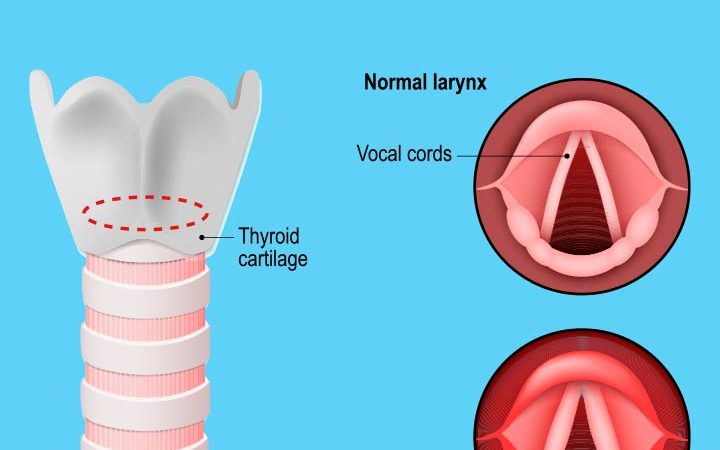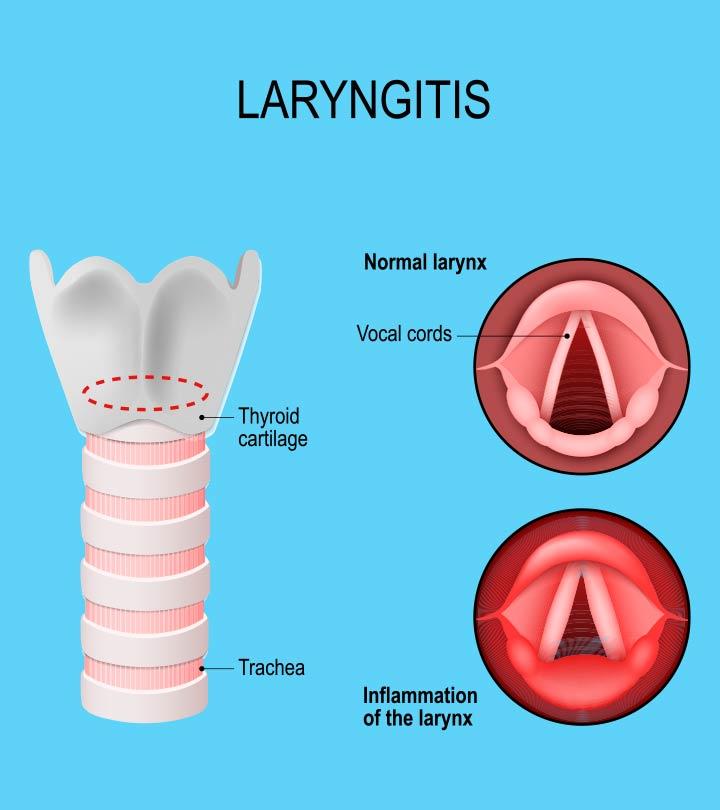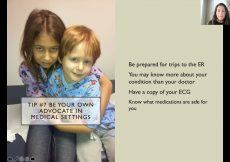The voice box or larynx harbors the vocal cords, which vibrate on speaking to create sounds. Laryngitis is the inflammation of the larynx, affecting the vocal cords and causing hoarseness of voice. Laryngitis in children can resolve spontaneously within a week or two, or it may become chronic, lasting for more than two weeks or even longer. Most cases are curable through the treatment of the underlying cause of the inflammation.
This post presents vital information about the symptoms, diagnosis, and treatment of laryngitis in children.
Types Of Laryngitis In Children
Laryngitis is of two types, based on the duration of inflammation and the underlying cause (1) (2).
- Acute laryngitis: It is a mild form of the condition that lasts for a week. The inflammation in the larynx is short-lived and may occur due to viral or bacterial infections or vocal strain.
- Chronic laryngitis: It is a severe form of laryngitis that lasts for more than two weeks. The condition is caused due to prolonged exposure to an inflammatory agent, an irritant, or an injury.
Signs And Symptoms Of Laryngitis In Children
The symptoms of laryngitis may show up abruptly and worsen over days or more if left untreated. Below are some of the notable signs and symptoms of laryngitis in children (3) (4).
- Changes in voice, such as a change in the pitch, hoarseness, huskiness, and harshness
- Difficulty in swallowing or pain while swallowing
- Throat pain, frequent throat clearing, and discomfort while talking
- Voice fatigue and loss of voice range in children
Causes Of Laryngitis
Laryngitis most commonly occurs due to upper respiratory tract infections from bacteria, viruses, and some fungi. The other causes may include the following (1) (5).
- Overuse of voice due to shouting or crying
- Development of nodules or polyps in the larynx or vocal cords
- Irritation due to allergies, smoke, or other airborne pollutants
- Irritation due to acid reflux in children with gastroesophageal reflux disease
- Inhalation of steroid medicines for the treatment of asthma
- Nerve damage in the larynx
Complications Of Laryngitis In Children
Untreated laryngitis in children may lead to the following complications, depending on the underlying cause and severity of laryngitis (6).
- Voice and speech problems
Diagnosis Of Laryngitis In Children
The doctor may diagnose laryngitis in children through the following methods (7).
- Evaluation of the medical history and physical examination.
- Voice analysis, where your child will be asked to speak or make different sounds at different pitches.
- Flexible laryngoscopy is used to visualize the vocal cords and detect cysts or nodules.
- MRI is recommended when the doctor suspects a nerve (connected to the larynx) abnormality.
- In rare cases, the doctor may advise a biopsy to rule out a laryngeal tumor.
When To See A Doctor
Acute laryngitis may subside without treatment or with home care. However, consult a doctor if your child experiences the following (8).
- Hoarse voice or changed voice lasting for more than two weeks
- Trouble breathing or swallowing
- Constant pain or irritation in the throat
Treatment For Laryngitis In Children
Acute laryngitis resolves in a week without treatment. The treatment for chronic laryngitis is directed towards treating the underlying cause of the condition.
- If laryngitis is due to an infection, your child’s doctor may ask your child to rest, increase fluid intake, and prescribe medications for treatment.
- If the condition is caused by too much yelling, shouting, or crying, the doctor may advise your child to rest their voice.
- If stomach acid (due to GERD) is the cause, the doctor may advise some medications and changes in diet, such as avoiding chocolates, spicy and fatty foods, and caffeinated beverages (5).
- Laryngitis due to allergies could be relieved by avoiding exposure to irritants.
- Some children with chronic laryngitis may require voice therapies, such as speech training, to resolve the symptoms and help in early recovery.
- Some causes, such as polyps, nerve damage, and tumor, may require surgical correction.
Remedies For Laryngitis In Children
Most children show improvement without any treatments. You may consider the following home measures and remedies to relieve laryngitis symptoms in your child (9).
- Ask your child to speak softly. You may ask them to reach out to the person they want to talk to instead of yelling from a distance.
- Encourage your child to practice resting of voice for a scheduled period during the day. Make sure your child does not get overexposed to smoky, dusty, or polluted environments.
- Give your child plenty of water and add moisture to the air with a cool-mist humidifier. These methods could help prevent a dry throat.
- Encourage your child to avoid excessive coughing and frequent clearing of the throat. You may provide them homemade cough remedies, such as ginger and honey, to reduce cough. Do not give over-the-counter cough medicines without consulting the doctor first.
Most voice disorders, including laryngitis, are seldom serious and resolve on their own with mild treatments and home care. You may encourage your child to rest their voice and drink plenty of fluids to keep their throat moist. However, if your child’s symptoms worsen or the hoarseness keeps getting worse, you must visit a doctor or ENT specialist for diagnosis of the underlying cause and treatment.
References:
MomJunction’s articles are written after analyzing the research works of expert authors and institutions. Our references consist of resources established by authorities in their respective fields. You can learn more about the authenticity of the information we present in our editorial policy.
Recommended Articles
- Pityriasis Rosea In Children: Causes, Symptoms, And Treatment
- Neck Pain In Children: Causes, Symptoms, Remedies, And Treatment
- Nasal Polyposis In Children: Causes, Symptoms, Treatment And Prevention
- Turner Syndrome In Children: Causes, Symptoms, Treatment, And Prevention
The following two tabs change content below.




































